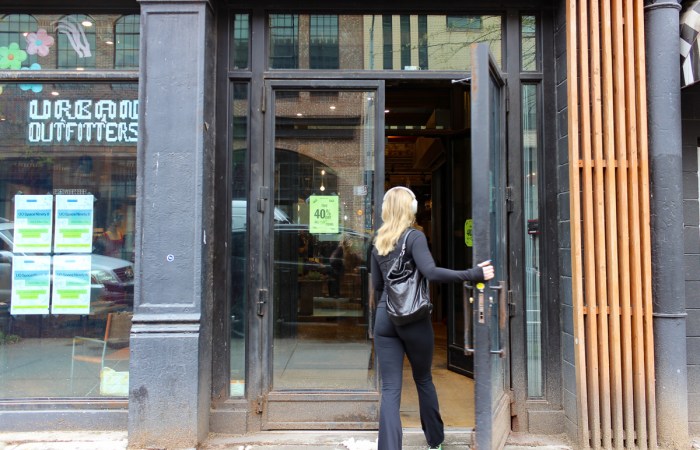A joke-filled Gotham amidst the pain of Republicanism and voters’ ‘values’
That with all its manic vicissitudes, New York can still be the funniest town on the planet was again proved by an incredible week of laughs, provided by some truly stellar performers.
The omnibus “The Downtown Plays” was highlighted by the short contributions of Douglas Carter Beane and Paul Rudnick. In Beane’s “He Meaning Him,” Josh Hamilton and a delightful Julie White hilariously sucked up to an invisible, pompously movie-shy writer in a desperate attempt to gain screen rights to a property, which they both obsequiously assured him would retain its gay flavor.
Jackie Hoffman, released from the mugging antics of “Hairspray,” solidified her Downtown Legend rep in “Pride and Joy,” playing Helene Nadler, the self-proclaimed best, most understanding mother ever (because of her tolerant love for her offspring: a lesbian, a transsexual and a leather queen). When someone’s cell phone went off during her monologue (to a Long Island PFLAG meeting), Hoffman, without missing a beat, and fully in character, shrieked, “Turn that off!”
Perhaps the week’s laugh-meter clocked its most robust performance during Bruce Vilanch’s visit to Seth Rudetsky’s “Chatterbox” at Don’t Tell Mama. Without benefit of set, lighting or even discernible two-drink minimum, Vilanch was his reliably uproarious self, oozing dishy diva anecdotes like water from a sponge. He recalled going up to Bette Davis at a holiday party and announcing, “Miss Davis, I have always wanted to say this to you: ‘Happy New Year’s, Eve!’” (She looked at him for a beat, and then replied, “Hah!”)
Vilanch also recalled interviewing Joan Crawford as a Chicago cub reporter. The lady brought her own silver “water” flask, which she kept pouring for herself and, at one point, when Vilanch went for it himself, she froze him with a terrifying glance. Vilanch was responsible for the writing on one of Rudetsky’s pet obsessions, “The Brady Bunch Variety Hour,” which showcased the non-singing, non-dancing talents of that cursedly cute clan. Some terrifying film clips were shown, which basically proved once more that Peter was undoubtedly the cutest (I’d still do him) and Robert Reed, doing disco, had absolutely no rhythm. Vilanch described Reed as a tortured soul because of his closeted homosexuality, who lived with his mother and basically became a surrogate father to the show’s kids. When I asked him if it was true that Reed was a leather queen, as rumored, Vilanch said, “Probably. He hated himself so much.”
At “Show,” a benefit concert presented the night before the election by Only Make Believe, the very worthy charitable organization that brings theater to chronically ill children, a very gay savvy Brad Oscar co-hosted with Hayley Mills. Standout performances included Harvey Fierstein and Dick Latessa (in terrific voice) doing their “Hairspray” duet, Darius de Haas singing the best “Age of Aquarius” I have ever heard, and Euan Morton’s lovely “Bless the Beasts and the Children.” Morton was a particular trouper, in light of the fact that his Armani outfit had been stolen out of the dressing room that afternoon. (Never mind, even in jeans, this Scot is always quite the hot man!) Rosie O’Donnell was in prominent attendance, and, at the after-party, I sat with some pals of hers—one of whom, the ultimate Craft Queen, makes those awesome all-candy creations that were featured on Rosie’s show—who raved on about her R Family cruise they took last July. Being a new devotee of ship travel, I pumped them, and they told me it was really Rosie’s partner Kelli’s show, with the star keeping a low profile,
“Although you’d see her, walking barefoot through the casino and she introduced the cabaret show every night,” they added.
They told me the entertainment, including the cast of “Taboo,” Judy Gold, Billy Porter and Christine Ebersole, was divine, at which point Seth Rudetsky popped up to announce that he was thinking about doing the next cruise. The passenger list evidently was surprisingly diverse and compatible, including two women who announced, “We’re straight but came on this cruise because we’re fat and figured no one would care.”
Laughs were certainly needed on Election Evening, as that idiot Son Also Rises (again). I watched the returns at a soiree in the art-filled manse of artist Arman and his lovely wife, Corice. Under the wall-sized Warhol portrait of our hosts, it was a fabulously eclectic gathering, from NY-1’s Roma Torre (“I have to get up at 6 a.m., but this will be worth the bags”) to “caterer to the stars,” Serena Bass, who has a new book out (“Serena, Food & Stories”) and told me she’s no longer involved with her Chelsea Hotel boîte, Serena, but is letting them use the name (“Until…”).
As the election returns depressingly filed in, I buried myself in a super-rare first edition in Arman’s library. Called “Negro,” it was an anthology of black-themed literature put out by eccentric, socially progressive Brit shipping line heiress Nancy Cunard in 1934, with translations by Samuel Beckett. I dressed as the Cecil Beaton-photographed Cunard one Halloween and have been fascinated by her ever since, despite someone telling me I looked like a “kamikaze flapper.” Among her anthology gleanings was a glossary of contemporary black slang, which included “booty,” “bodacious,” “peckerwood” and a whole range of terms for the “n-word,” often used affectionately, oddly enough.
Mario Cantone, released from the bother of trying to harness his mania into a conventional role (“The Violet Hour,” “Assassins”), literally slaughtered the audience with his “Laugh Whore.” Somewhat overlong, and with a weirdly superfluous intermission, the show was best in its more autobiographical moments, which ranged from Cantone shrieking like Faye Dunaway as Joan Crawford at one of those annoyingly inept, cell phone-yakking cabdrivers, to his growing up Italian and gay in a dysfunctional, “Moonstruck”-on-steroids family to (most genius of all) his time spent teaching deaf kids, who proved just as profane and obnoxious as any “unchallenged” teenager.
His Liza Minnelli impersonation was funny, if cruel, but he should leave Judy Garland to Tommy Femia and Mary Birdsong, who do her better and really honor, rather than insult, her sacrosanct memory. The production was given an elegance Elaine Stritch herself would envy, via Robert Brill’s set and snazzy lighting by Jules Fisher and Peggy Eisenhauer.
Ordinarily, I am not a fan of high-concept, minimalist theater, but Shared Experience’s “A Passage to India,” at BAM, proved enthralling. Magically directed by Nancy Meckler, an entire colony, with steaming locomotives, garden parties, elephants, courtrooms, jail cells and those infamous Malabar Caves, was evoked on a largely bare stage. Fenella Woolgar, who has already this year illuminated three films—“Vera Drake,” “Stage Beauty” and, especially, “Bright Young Things”—was the apotheosis of repressed Brit colonizer, as silly, sensually addled Adela Quested. As Mrs. Moore, a very “suburban” (that favored English slight) Susan Tracy didn’t begin to approach the luminosity Peggy Ashcroft brought to David Lean’s 1984 film version, but Alex Caan, as the vilified Dr. Aziz, had dazzling star quality. Matinee idol handsome, he evinced a breathtaking character development, taking Aziz from a radiantly silly people pleaser, with a put-on old duffer’s laugh, to a deeply embittered, illusion-less cynic. Simon Scardifield, so delightful as Puck in the all-male “Midsummer Night”’s Dream at BAM earlier this year, showed his range, as Adela’s priggish, but somehow touching suitor, Ronny.
Martin Sherman’s merely serviceable adaptation overstressed the homoerotic tension between Aziz and his friend Fielding (William Osborne), and made the decided mistake of having Antony Bunsee, as Professor Godbole, narrate the whole thing in the most intrusive, tiresome and superfluous manner. It will be remembered that a hideous, ethnically clichéd Alec Guinness, as Godbole, also nearly ruined the film version.
On a more somber note, Chungmi Kim’s play, “Comfort Women,” presented by Urban Stages, deals with a powerful, little-known subject—those thousands of Korean women who were forced to become sexual slaves for the Japanese Army during the Second World War. Centered around the 1994 U.N. protest which finally elicited a formal apology from a Japan all too-willing to whitewash the past, it’s crudely written and stridently acted, but nevertheless succeeds in shedding light on this horrific atrocity.
Only about 100 comfort women survive today, and their story is one that needs to be retold again and again, as universal memory conveniently fades. “Chosun pi (Korean whore)!” was what they were called, and, apart from the unimaginable brutality they suffered (being raped daily by hundreds of men, vaginal torture with cigarettes, bamboo needles shoved under fingernails, breasts sliced off and even, according to one account, being forced to copulate with a dog), they were both ignored and ostracized in their own country as distasteful, obstreperous reminders of the past.
A small exhibit in the lobby says even more than the play, with a 1938 photo of comfort women in the employ of Mitsubishi (yes, that Mitsubishi) Company.
Contact David Noh at Inthenoh@aol.com.
We also publish:



































